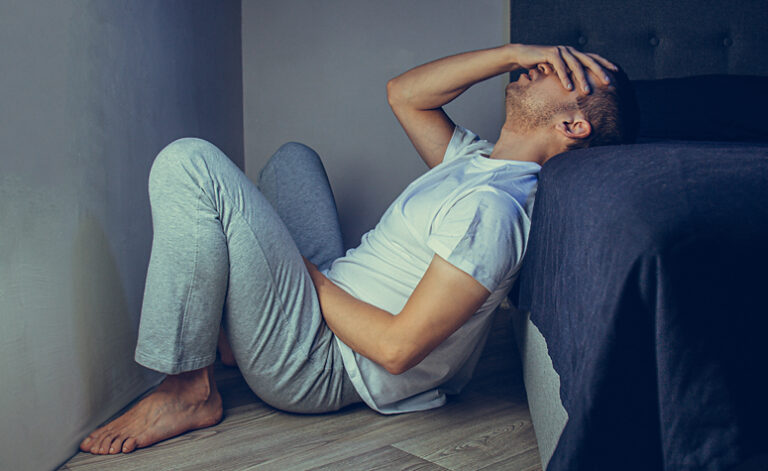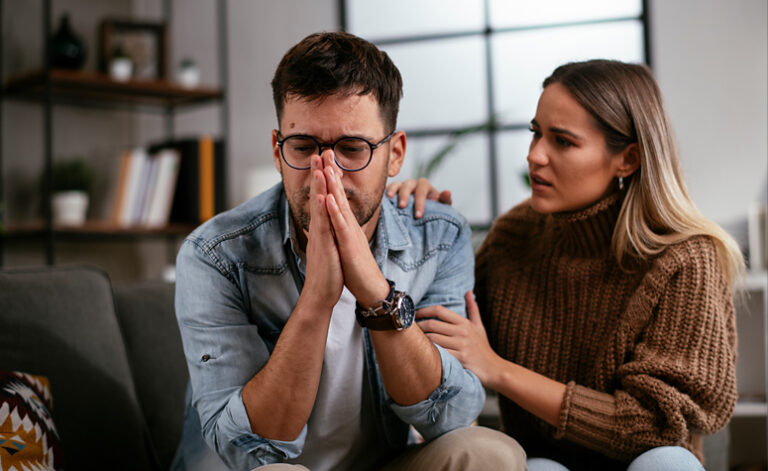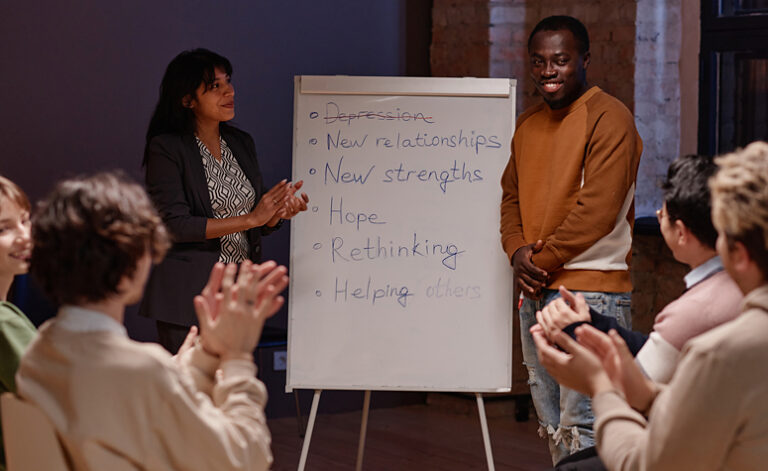What are the Signs and Symptoms of Depression
Unhappiness and despair are normal because everyone goes through them. Sometimes, we may respond to daily challenges with sadness or helplessness. When these feelings become overwhelming to the point that they are negatively affecting your life, you may be suffering from depression. It’s estimated that 280 million people all over the world are struggling with depression.

Early Signs of Depression
Depression manifests in many different ways. The signs and symptoms, as well as the onset of these symptoms, are not the same for everyone, making it hard to identify specific “early” signs of depression. However, there are common signs of depression. If you think you or someone you know may be suffering from depression, look for the following symptoms:
- Lack of energy
- Appetite changes
- Changes in sleep patterns
- Difficulty focusing or making decisions
- Feeling low or down
- Bodily aches and pains
Experiencing any of the symptoms mentioned above doesn’t automatically mean that a person is clinically depressed. It is natural to go through times of low mood, sadness, and similar emotions during our lifetime, and these symptoms may just be a result of experiences rather than depression.
Common Symptoms of Depression
Symptoms of depression and the degree of severity are not the same for everyone. The symptoms of people suffering from depression often affect their daily activities, work, relationships, and /or family life.
Below are symptoms of how you might feel and how your body might react if you are struggling with depression.

What lies behind us and what lies before us are
tiny matters compared to what lies within us
Psychological symptoms of depression
One of the hallmark symptoms of depression is losing interest and pleasure in things that you used to enjoy. You may also find that you have no motivation to do anything.
- Feelings of guilt
- Anxiety
- Irritability
- Drug and alcohol abuse
- Flat affect (reduced emotional reactivity)
- Feelings of worthlessness and hopelessness
- Loss of interest in things you once enjoyed
- Lack of interest in your physical appearance or personal hygiene
- Intense feelings of sadness which affects your ability to perform
normal daily functions effectively and take care of yourself - Tearfulness and frequent crying and becoming highly emotional
for no obvious apparent reason - Suicidal thoughts
If the idea of taking your own life has entered your mind, or if you know someone having suicidal thoughts, you must seek help immediately. Contact a suicide helpline, such as Samaritans and ask for an urgent GP appointment, or go directly to the A&E department at the hospital nearest you. For detailed information, visit our crisis support page.
Physical symptoms of depression
Sometimes, depression can also manifest physically. Below are some common physical symptoms to look out for if you are struggling with depression:
- Low energy/excessive fatigue
- Psychomotor agitation (restlessness or unable to sit still)
- Psychomotor retardation (slowing of movements)
- Sleep disturbances such as insomnia or difficulty getting out of bed
- Unexplained digestive problems
- Unexplained aches and pains
- Changes in appetite – either an increased or decreased appetite
which results in weight fluctuations - Sexual dysfunction, including reduced libido and erectile difficulties
Sometimes, depression can also manifest physically with symptoms like gastrointestinal trouble or chronic pain. If you are experiencing any of these symptoms or are worried about your mental health, it’s crucial to get professional help. With proper treatment and support, depression can be managed, improving your quality of life.

What Does Depression Feel Like?
If you are experiencing depression, you will be emotionally unstable, with your mood changing from day to day. On some days, you are able to control your emotions and deal with the challenges before you. You may feel more positive and cheerful and find it easier to ignore the more difficult emotions. The feeling of sadness and hopelessness may not be there (a key symptom of depression), and you feel that you are able to manage your thoughts and emotions.
But there will also be days when you feel terribly low and depressed. The symptoms can feel more intense, and you think the coming days will be tough. You may be irritable and have angry outbursts on certain days, while on others, you may feel overwhelmed and easily drawn to tears.
Although every person experiences depression differently, going through a roller coaster of emotions is common. Sometimes, you may feel that you will never be happy again. Still, on other days, you may experience bursts of positivity and delight.

Fast Access to Residential Treatment
We are currently able to offer fast access to private inpatient treatment.
Please call us today and speak to one of our expert advisors.
Call in confidence: 0800 0148 970
Risk factors for depression
There are certain life events or situations that make you more vulnerable to depression. The condition is rarely due to a single cause; other factors often magnify the impact of these life events, resulting in depression. These life events include:
- A recent divorce
- Death of a loved one
- Job loss
- High levels of stress
- Chronic illness or pain
Factors such as your age, gender, and life circumstances can influence the likelihood of you suffering from a type of depression such as dysthymia, bipolar depression or clinical depression. They may also determine the kind of symptoms you experience.
Women
Based on statistics, more women than men experience depression. A large-scale survey published in the journal Psychological Bulletin revealed that women and girls were twice as likely as men to suffer from depression.
Men
Although depression is less common in men than in women, it is important to recognise that men are less inclined to talk freely about their feelings and prefer to keep these to themselves, which in turn increases the likelihood of matters becoming complicated over time. Statistics say that despite 77% of men saying they have experienced depression, 40% admit to not discussing their emotions with anyone.
Age
Depression can affect anyone regardless of age, but statistics indicate that 7% of people above the age of 60 suffer from it – a higher rate than those under 60. In general, the older you get, the more likely you will experience the physical symptoms of depression, such as fatigue and unexplained bodily aches and pain.
Children and teenagers suffering from depression
Unfortunately, children and teenagers can also suffer from depression. If you’re concerned that your child or teenager is experiencing depression, look out for changes in behaviour at home or in school. Signs and symptoms of depression in young people might include:
- Heightened hostility or angry outbursts
- Low mood
- Less interaction with their friends
- Reduced ability to concentrate or decline in academic performance
If your child or teenager is showing any of the above symptoms, or you are worried about their mental health, it’s crucial to seek professional help. With proper treatment and support, depression in young people can be managed, improving their quality of life, both now and for their future.

Treating Depression
Whatever your gender, age or life circumstances, it’s crucial to understand that depression can be treated. Help is available, and you deserve assistance to get your life back on track.
If you are experiencing the symptoms mentioned above and they are negatively affecting your life, this might be the right time to seek professional help. Your first step is to see your GP, who can diagnose you and provide professional advice.
To confirm a diagnosis of depression, a doctor will evaluate your mental state and look for specific symptoms. Based on the Diagnostic and Statistical Manual of Mental Disorders, fifth edition (DSM-%), which is used for diagnosing depression, doctors must identify two “core” symptoms:
- During the last month, have you often been bothered by
feeling down, depressed, or hopeless? - Do you have little interest or pleasure in doing things?
The doctor making the assessment will determine if one or both of these symptoms have been present for at least two weeks.
You can also seek depression treatment with our health specialists, where we collaborate with you to create a recovery programme tailored to your needs and circumstances. Our treatment options include inpatient stays, weekly outpatient therapy sessions that allow you to work your sessions around your life and work commitments, and online therapy that enables you to have your sessions from the comfort of your home.
Depression is a mental illness and not an indication of weakness. You can overcome depression and make a lasting recovery. Get the help you need today by giving us a call and discussing your struggle with our highly trained mental health professionals.
FREE Depression Assessment
If you or a loved one are struggling with depression, there is hope and healing for you. You can receive treatment as an outpatient or inpatient and through one-on-one or support group therapy. We understand the challenges you’re facing and we’re here to offer compassionate help and support.
We design personalised treatment plans that meet an individual’s unique needs and circumstances. We will work together to address your symptoms, help you develop coping strategies and enable you to live life to the full in a healthy and positive manner.
We also have a young people’s service which provides specialist depression treatment exclusively for adolescents and young people.
Our highly trained advisers are available to speak to you right away, simply call 0808 252 3379 today.
We can discuss your concerns in complete confidence, explore the options for treatment, and help you to understand what will work best for you.
We’ll also help you to book your free depression assessment there and then, with appointments usually available within only a few days.
We understand that taking the first step can be the most difficult, but we’re here to support – with no pressure or judgement.
Professional and compassionate help is just a phone call or click away.




